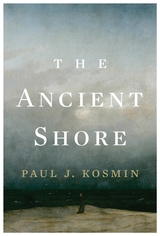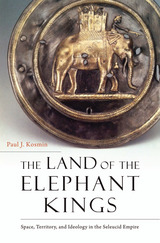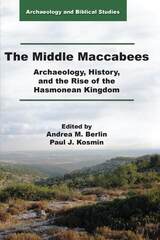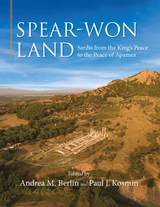
An esteemed historian explores the natural and social dynamics of the ancient coastline, demonstrating for the first time its integral place in the world of Mediterranean antiquity.
As we learn from The Odyssey and the Argonauts, Greek dramas frequently played out on a watery stage. In particular, antiquity’s key events and exchanges often occurred on coastlines. Yet the shore was not just a site of conquest and trade, ire and yearning. The seacoast was a singular kind of space and was integral to the cosmology of the Greeks and their neighbors. In The Ancient Shore, award-winning historian Paul Kosmin reveals the influence of the coast on the inner lives of the ancients: their political thought, scientific notions, artistic endeavors, and myths; their sense of wonder and of self.
The Ancient Shore transports readers to a time when the coast was an unpredictable, formidable site of infinite and humbling possibility. Shorelines served as points of connection and competition that fostered distinctive political identities. It was at the coast—ever violent, ever permeable to predation—that state power ended, and so the coast was fundamental to theories of sovereignty. Then too, the boundary of land and sea symbolized human limitation, making it the subject of elaborate and continuous philosophical, scientific, and religious attention.
Kosmin’s ancient world is expansive, connecting the Atlantic to the Straits of Malacca, the Black Sea to the Indian Ocean. And his methods are similarly far-ranging, integrating accounts of statecraft and commerce with intellectual, literary, religious, and environmental history. The Ancient Shore is a radically new encounter with people, places, objects, and ideas we thought we knew.

A Choice Outstanding Academic Title of the Year
The Seleucid Empire (311–64 BCE) was unlike anything the ancient Mediterranean and Near Eastern worlds had seen. Stretching from present-day Bulgaria to Tajikistan—the bulk of Alexander the Great’s Asian conquests—the kingdom encompassed a territory of remarkable ethnic, religious, and linguistic diversity; yet it did not include Macedonia, the ancestral homeland of the dynasty. The Land of the Elephant Kings investigates how the Seleucid kings, ruling over lands to which they had no historic claim, attempted to transform this territory into a coherent and meaningful space.
“This engaging book appeals to the specialist and non-specialist alike. Kosmin has successfully brought together a number of disparate fields in a new and creative way that will cause a reevaluation of how the Seleucids have traditionally been studied.”
—Jeffrey D. Lerner, American Historical Review
“It is a useful and bright introduction to Seleucid ideology, history, and position in the ancient world.”
—Jan P. Stronk, American Journal of Archaeology

A focused, interdisciplinary examination of a tumultuous, history-making era
The Middle Maccabees lays out the charged, complicated beginnings of the independent Jewish state founded in the second century BCE. Contributors offer focused analyses of the archaeological, epigraphic, numismatic, and textual evidence, framed within a wider world of conflicts between the Ptolemies of Egypt, the Seleucids of Syria, and the Romans. The result is a holistic view of the Hasmonean rise to power that acknowledges broader political developments, evolving social responses, and the particularities of local history. Contributors include Uzi ‘Ad, Donald T. Ariel, Andrea M. Berlin, Efrat Bocher, Altay Coşkun, Benedikt Eckhardt, Gerald Finkielsztejn, Christelle Fischer-Bovet, Yuval Gadot, Erich Gruen, Sylvie Honigman, Jutta Jokiranta, Paul J. Kosmin, Uzi Leibner, Catharine Lorber, Duncan E. MacRae, Dvir Raviv, Helena Roth, Débora Sandhaus, Yiftah Shalev, Nitsan Shalom, Danny Syon, Yehiel Zelinger, and Ayala Zilberstein.
Features
- Up-to-date, generously illustrated essays analyzing the relevant archaeological remains
- A revised understanding of how local and imperial histories overlapped and intersected
- New analysis of the book of 1 Maccabees as a tool of Hasmonean strategic interest

The contributors to this volume are members of the Hellenistic Sardis Project, a research collaboration between long-standing expedition members and scholars keenly interested in the site. These new discussions on the pre-Roman history of Sardis restore the city in the scholarship of the Hellenistic East and will be enlightening to scholars of classical archaeology.

Winner of the Runciman Award
Winner of the Charles J. Goodwin Award
“Tells the story of how the Seleucid Empire revolutionized chronology by picking a Year One and counting from there, rather than starting a new count, as other states did, each time a new monarch was crowned…Fascinating.”
—Harper’s
In the aftermath of Alexander the Great’s conquests, his successors, the Seleucid kings, ruled a vast territory stretching from Central Asia and Anatolia to the Persian Gulf. In 305 BCE, in a radical move to impose unity and regulate behavior, Seleucus I introduced a linear conception of time. Time would no longer restart with each new monarch. Instead, progressively numbered years—continuous and irreversible—became the de facto measure of historical duration. This new temporality, propagated throughout the empire and identical to the system we use today, changed how people did business, recorded events, and oriented themselves to the larger world.
Some rebellious subjects, eager to resurrect their pre-Hellenic past, rejected this new approach and created apocalyptic time frames, predicting the total end of history. In this magisterial work, Paul Kosmin shows how the Seleucid Empire’s invention of a new kind of time—and the rebellions against this worldview—had far reaching political and religious consequences, transforming the way we organize our thoughts about the past, present, and future.
“Without Paul Kosmin’s meticulous investigation of what Seleucus achieved in creating his calendar without end we would never have been able to comprehend the traces of it that appear in late antiquity…A magisterial contribution to this hitherto obscure but clearly important restructuring of time in the ancient Mediterranean world.”
—G. W. Bowersock, New York Review of Books
“With erudition, theoretical sophistication, and meticulous discussion of the sources, Paul Kosmin sheds new light on the meaning of time, memory, and identity in a multicultural setting.”
—Angelos Chaniotis, author of Age of Conquests
READERS
Browse our collection.
PUBLISHERS
See BiblioVault's publisher services.
STUDENT SERVICES
Files for college accessibility offices.
UChicago Accessibility Resources
home | accessibility | search | about | contact us
BiblioVault ® 2001 - 2024
The University of Chicago Press









